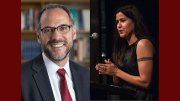The orator and poet at the 2023 Phi Beta Kappa Literary Exercises—the traditional, academic opening event of Harvard’s Commencement-week celebrations—will be Adam Falk, Ph.D. ’91, and Natalie Diaz. They are scheduled to appear on Tuesday morning, May 23, in Sanders Theatre.
Falk, a theoretical physicist, has served as president of the Alfred P. Sloan Foundation since 2018. He was previously president of Williams College (2010-2017) and dean of the school of arts and sciences (2006-2010) at Johns Hopkins University, where he joined the physics faculty in 1994. The Sloan Foundation is a major source of support for research and education in science, technology, engineering, mathematics, and economics; the 125 2023 Sloan Research Fellows—promising early-career researchers who are awarded two-year, $75,000 fellowships—include seven Harvard scholars.
Diaz, Marshall Chair in modern and contemporary poetry and associate professor in the Department of English at Arizona State University, is author of When My Brother Was an Aztec (2012 ), described by the Academy of American Poets as a work by “a sister who is struggling with her brother's drug addiction, within a family dynamic steeped in the mythology and cultural history of reservation life.” It won an American Book Award. Her publisher notes that Diaz, “a member of the Mojave and Pima Indian tribes, attended Old Dominion University on a full athletic scholarship. After playing professional basketball in Austria, Portugal, Spain, Sweden, and Turkey she returned to ODU for an MFA in writing.” Her second collection, Postcolonial Love Poem (2020), won the 2021 Pulitzer Prize in poetry. The same year, she was elected a chancellor of the Academy of American Poets. She was also awarded a 2018 MacArthur Fellowship recognizing her “experience as a Mojave American and Latina [who] challenge[s] the mythological and cultural touchstones underlying American society.”
The Literary Exercises (this will be the 231st iteration) celebrate undergraduate academic excellence, recognize outstanding students’ nominees for formative teaching, and typically nod toward the arts (the poet) and the wider society (the orator). They thus bridge the academic labors leading up to graduation, and the celebratory hoopla to follow two days later, in Tercentenary Theatre.









